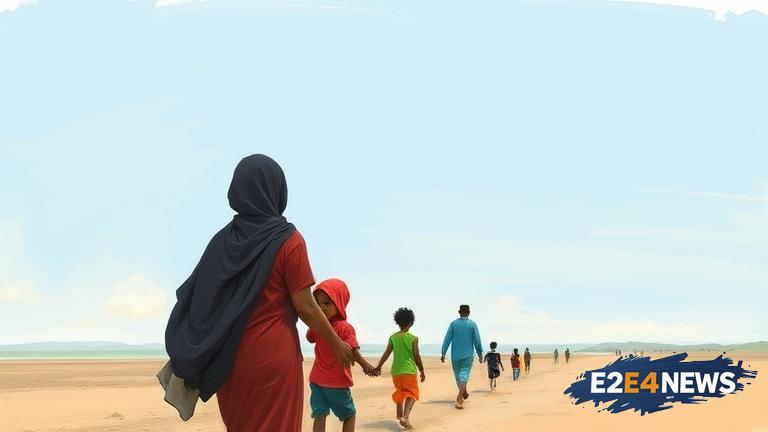The Rohingya refugee crisis has been an ongoing concern for several years, with hundreds of thousands of individuals displaced from their homes in Myanmar. Currently, many of these refugees are residing in camps in Bangladesh, where they face numerous challenges, including inadequate living conditions, limited access to education and healthcare, and a lack of economic opportunities. Despite these difficulties, the Rohingya refugees remain determined to return to their homeland, where they can rebuild their lives and communities. However, this goal is hindered by the need for guarantees of safety and security, which the international community is being urged to provide. The refugees are calling for increased support and protection from the global community, including the United Nations and other humanitarian organizations. This support is essential for ensuring that the refugees can return to Myanmar without fear of persecution or violence. The situation in the Bangladeshi camps is becoming increasingly dire, with reports of overcrowding, poor sanitation, and limited access to basic necessities like food and water. The refugees are also at risk of exploitation and abuse, particularly women and children. In light of these challenges, it is imperative that the international community takes immediate action to address the needs of the Rohingya refugees. This includes providing increased funding for humanitarian aid, as well as working to establish a safe and sustainable environment for the refugees to return to. The Myanmar government has a critical role to play in this process, as it must work to ensure that the refugees are able to return to their homes without fear of persecution or violence. This will require significant reforms, including the establishment of a fair and impartial justice system, as well as measures to prevent discrimination and promote social cohesion. The international community must also work to hold the Myanmar government accountable for its actions, including any human rights abuses that may have occurred. In addition to these efforts, it is essential that the global community provides ongoing support to the Rohingya refugees, including access to education, healthcare, and economic opportunities. This will help to ensure that the refugees are able to rebuild their lives and communities, and to create a brighter future for themselves and their families. The Rohingya refugee crisis is a complex and multifaceted issue, requiring a comprehensive and sustained response from the international community. It is only through collective action and a commitment to human rights and dignity that we can hope to resolve this crisis and ensure a safe and sustainable future for the Rohingya refugees. The refugees themselves are playing a critical role in this process, as they work to rebuild their lives and communities. Their resilience and determination in the face of adversity are a testament to the human spirit, and a reminder of the importance of protecting and promoting human rights. As the international community works to address the needs of the Rohingya refugees, it is essential that we prioritize their safety, dignity, and well-being. This includes ensuring that they have access to basic necessities like food, water, and shelter, as well as protecting them from exploitation and abuse. The situation in the Bangladeshi camps is a stark reminder of the need for urgent action, and the international community must work together to provide the necessary support and resources to address this crisis. The Rohingya refugees are not just statistics or numbers, but human beings who deserve our respect, dignity, and compassion. It is our collective responsibility to ensure that they are able to live in safety and dignity, and to rebuild their lives and communities. The international community must work together to provide a comprehensive and sustained response to this crisis, including increased funding for humanitarian aid, as well as efforts to establish a safe and sustainable environment for the refugees to return to. This will require a long-term commitment to addressing the root causes of the crisis, as well as providing ongoing support to the Rohingya refugees. The situation is complex and challenging, but with collective action and a commitment to human rights and dignity, we can hope to resolve this crisis and ensure a safe and sustainable future for the Rohingya refugees.
